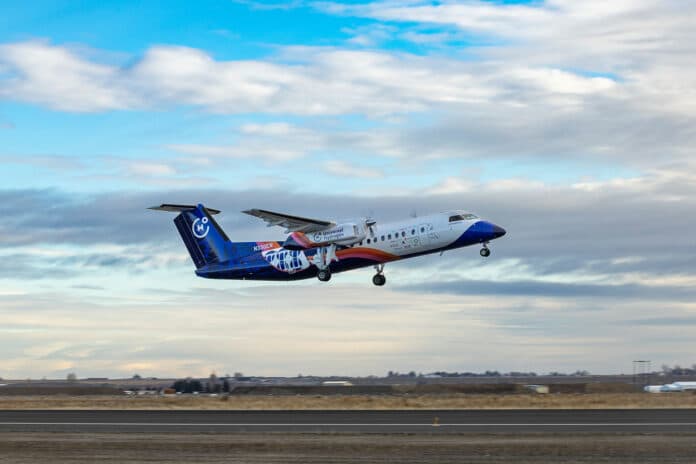Californis-based Aerospace company, Universal Hydrogen, flew a 40-passenger regional airliner using hydrogen fuel cell propulsion. Called Lightning McClean, the airplane took off from Grant County International Airport (KMWH) and flew for 15 minutes, reaching an altitude of 3,500 mean sea level (MSL) before safely landing.
The flight, conducted under an FAA Special Airworthiness Certificate, was the first in a two-year flight test campaign expected to culminate in 2025 with entry into passenger service of ATR 72 regional aircraft converted to run on hydrogen.
Representatives from Connect Airlines and Amelia, the U.S. and European launch customers for the hydrogen airplanes, respectively, were on hand to witness the historic flight. The company has a rapidly growing order book, today totaling 247 aircraft conversions from 16 customers worldwide.
In a recent test flight, one of the airplane’s turbine engines was replaced with Universal Hydrogen’s fuel cell-electric, megawatt-class powertrain. The other remained a conventional engine for the safety of flight. The flight was piloted by Alex Kroll, an experienced former U.S. Air Force test pilot and the company’s chief test pilot.
“During the second circuit over the airport, we were comfortable with the performance of the hydrogen powertrain, so we were able to throttle back the fossil fuel turbine engine to demonstrate cruise principally on hydrogen power,” said Kroll. “The airplane handled beautifully, and the noise and vibrations from the fuel cell powertrain are significantly lower than from the conventional turbine engine.”
The company’s powertrain is built around Plug Power’s ProGen family of fuel cells specially modified for aviation use. One of the unique aspects of the design is that the powertrain does not use a battery – the fuel cells drive the electric motor directly – drastically reducing weight and cost. Everett-based magniX supplied the motor, a modified magni650 electric propulsion unit, and power electronics.
In addition, Seattle-based AeroTEC assisted with engineering efforts, including the design of the modified nacelle structure, aircraft systems design, and integration, as well as aircraft modifications and installation of the Universal Hydrogen powertrain onto the flight test aircraft, accomplished in less than 12 months.
“The airplanes are converted to hydrogen using an aftermarket retrofit conversion kit, tackling the existing fleet rather than developing a brand new airplane,” said Paul Eremenko, co-founder and CEO of Universal Hydrogen. “And hydrogen fueling uses modular capsules compatible with existing freight networks and airport cargo handling equipment, making every airport in the world hydrogen-ready.”
